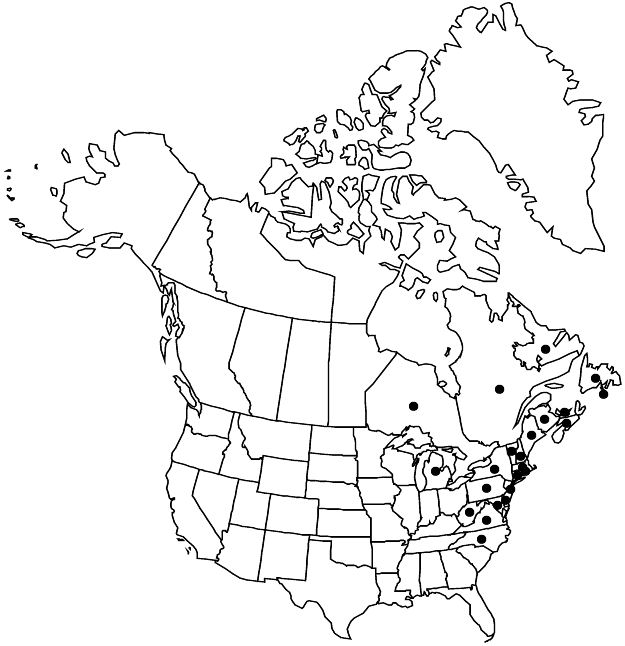Difference between revisions of "Spiraea alba var. latifolia"
Handb. Laubholzk. 3: 484. 1893.
FNA>Volume Importer |
FNA>Volume Importer |
||
| Line 22: | Line 22: | ||
|name=S. alba var. septentrionalis | |name=S. alba var. septentrionalis | ||
|authority=(Fernald) Fosberg | |authority=(Fernald) Fosberg | ||
| − | }}{{Treatment/ID/Synonym | + | }} {{Treatment/ID/Synonym |
|name=S. bethlehemensis | |name=S. bethlehemensis | ||
|authority=Willdenow | |authority=Willdenow | ||
| − | }}{{Treatment/ID/Synonym | + | }} {{Treatment/ID/Synonym |
|name=S. carpinifolia | |name=S. carpinifolia | ||
|authority=Rafinesque | |authority=Rafinesque | ||
| − | }}{{Treatment/ID/Synonym | + | }} {{Treatment/ID/Synonym |
|name=S. heterophylla | |name=S. heterophylla | ||
|authority=(Aiton) Borkhausen | |authority=(Aiton) Borkhausen | ||
| − | }}{{Treatment/ID/Synonym | + | }} {{Treatment/ID/Synonym |
|name=S. latifolia | |name=S. latifolia | ||
|authority=Rafinesque | |authority=Rafinesque | ||
| − | }}{{Treatment/ID/Synonym | + | }} {{Treatment/ID/Synonym |
|name=S. latifolia var. septentrionalis | |name=S. latifolia var. septentrionalis | ||
|authority=Fernald | |authority=Fernald | ||
| − | }}{{Treatment/ID/Synonym | + | }} {{Treatment/ID/Synonym |
|name=S. obovata | |name=S. obovata | ||
|authority=(Fernald) Á. Löve & D. Löve | |authority=(Fernald) Á. Löve & D. Löve | ||
| − | }}{{Treatment/ID/Synonym | + | }} {{Treatment/ID/Synonym |
|name=S. ovata | |name=S. ovata | ||
|authority=unknown | |authority=unknown | ||
| − | }}{{Treatment/ID/Synonym | + | }} {{Treatment/ID/Synonym |
|name=S. septentrionalis | |name=S. septentrionalis | ||
|authority=unknown | |authority=unknown | ||
| Line 61: | Line 61: | ||
|elevation=0–1500 m | |elevation=0–1500 m | ||
|distribution=St. Pierre and Miquelon;N.B.;Nfld. and Labr.;N.S.;Ont.;P.E.I.;Que.;Conn.;Del.;Maine;Md.;Mass.;Mich.;N.H.;N.J.;N.Y.;N.C.;Pa.;R.I.;Vt.;Va.;W.Va. | |distribution=St. Pierre and Miquelon;N.B.;Nfld. and Labr.;N.S.;Ont.;P.E.I.;Que.;Conn.;Del.;Maine;Md.;Mass.;Mich.;N.H.;N.J.;N.Y.;N.C.;Pa.;R.I.;Vt.;Va.;W.Va. | ||
| − | |discussion=<p>Variety septentrionalis was first described by Fernald, who found it occupying a number of unique boreal and subalpine areas of the northeastern United States and southeastern Canada; it was raised to specific rank by Á. Löve and D. Löve based upon its chromosome number (2n = 54). Populations of var. latifolia that have been ascribed to var. septentrionalis are cited as differing in being alpine, subalpine, and boreal. In New Hampshire, D. D. Sperduto (2005) characterized it as an alpine and subalpine obligate that occurs in ravines and snowbed communities. A. Haines (pers. comm.) could not find any unique floral morphological characteristic to distinguish populations of var. septentrionalis from var. latifolia. Additional work is needed to determine if the polyploid populations (identified as var. septentrionalis) have unique ecological tolerances and if other physiological or morphological characteristics will allow consistent distinction from var. latifolia.</p> | + | |discussion=<p>Variety septentrionalis was first described by Fernald, who found it occupying a number of unique boreal and subalpine areas of the northeastern United States and southeastern Canada; it was raised to specific rank by Á. Löve and D. Löve based upon its chromosome number (2n = 54). Populations of <i></i>var.<i> latifolia</i> that have been ascribed to <i></i>var.<i> septentrionalis</i> are cited as differing in being alpine, subalpine, and boreal. In New Hampshire, D. D. Sperduto (2005) characterized it as an alpine and subalpine obligate that occurs in ravines and snowbed communities. A. Haines (pers. comm.) could not find any unique floral morphological characteristic to distinguish populations of <i></i>var.<i> septentrionalis</i> from <i></i>var.<i> latifolia</i>. Additional work is needed to determine if the polyploid populations (identified as <i></i>var.<i> septentrionalis</i>) have unique ecological tolerances and if other physiological or morphological characteristics will allow consistent distinction from <i></i>var.<i> latifolia</i>.</p> |
|tables= | |tables= | ||
|references= | |references= | ||
| Line 85: | Line 85: | ||
|publication year=1893 | |publication year=1893 | ||
|special status=Endemic;Weedy | |special status=Endemic;Weedy | ||
| − | |source xml=https://jpend@bitbucket.org/aafc-mbb/fna-data-curation.git/src/ | + | |source xml=https://jpend@bitbucket.org/aafc-mbb/fna-data-curation.git/src/8f726806613d60c220dc4493de13607dd3150896/coarse_grained_fna_xml/V9/V9_670.xml |
|subfamily=Rosaceae subfam. Amygdaloideae | |subfamily=Rosaceae subfam. Amygdaloideae | ||
|tribe=Rosaceae tribe Spiraeeae | |tribe=Rosaceae tribe Spiraeeae | ||
Revision as of 19:18, 18 September 2019
Leaves: petiole 2–4 mm, sparsely hairy; blade broadly oblanceolate to obovate, 2–8 × 1–3 cm, length 2–3 times width, membranous, base cuneate to rounded, margins coarsely serrate, apex acute to obtuse. Panicles open, pyramidal, 5–20 × 3–10 cm. Pedicels 2–3 mm. Flowers 3–5 mm diam.; hypanthia abaxial surface glabrous or glabrate; sepals 0.8–1.5 mm; petals 1.3–1.5(–3) mm; stamens 30–35, 2 times petal length. 2n = 36, 54.
Phenology: Flowering Jun–Sep; fruiting Jun–Nov.
Habitat: Moist or dry open sites, meadows, fields, forest margins
Elevation: 0–1500 m
Distribution

St. Pierre and Miquelon, N.B., Nfld. and Labr., N.S., Ont., P.E.I., Que., Conn., Del., Maine, Md., Mass., Mich., N.H., N.J., N.Y., N.C., Pa., R.I., Vt., Va., W.Va.
Discussion
Variety septentrionalis was first described by Fernald, who found it occupying a number of unique boreal and subalpine areas of the northeastern United States and southeastern Canada; it was raised to specific rank by Á. Löve and D. Löve based upon its chromosome number (2n = 54). Populations of var. latifolia that have been ascribed to var. septentrionalis are cited as differing in being alpine, subalpine, and boreal. In New Hampshire, D. D. Sperduto (2005) characterized it as an alpine and subalpine obligate that occurs in ravines and snowbed communities. A. Haines (pers. comm.) could not find any unique floral morphological characteristic to distinguish populations of var. septentrionalis from var. latifolia. Additional work is needed to determine if the polyploid populations (identified as var. septentrionalis) have unique ecological tolerances and if other physiological or morphological characteristics will allow consistent distinction from var. latifolia.
Selected References
None.